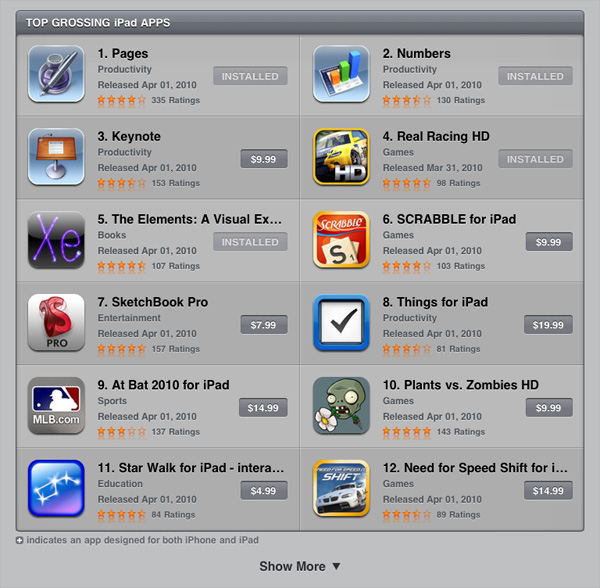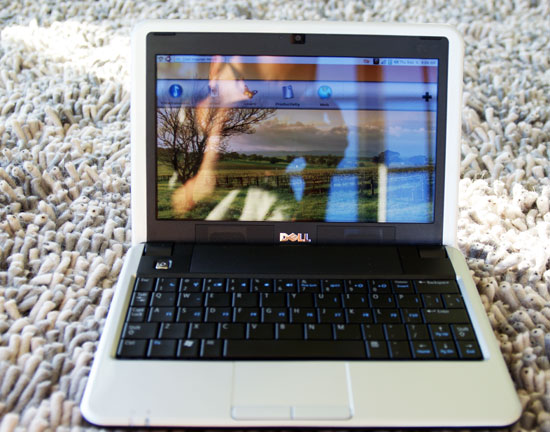Anand's Thoughts on Google's Chrome OS
by Anand Lal Shimpi on December 8, 2010 6:23 PM ESTFifteen years ago if you wanted to write an application that would run on over 90% of the world’s personal computers, you only needed to target one OS. Today, to do the same, you’d need to develop for ten - Windows, Linux, OS X, Android, iOS, webOS, BlackBerry OS, Symbian, MeeGo and of course, the web.
You don’t get order without first having chaos and you don’t end up with consolidation without first going through fragmentation. The PC era was dominated by Microsoft and Intel. The transition to ubiquitous computing allowed for many more competitors, which results in a great deal of fragmentation up front.
The goal however, is the same. Every player in this space wants to be what Microsoft was during the PC era. Even the actions are the same. There’s no interoperability between platforms, there are closed door negotiations and exclusivity agreements resulting in a number of alliances that are not easily broken.

Microsoft’s leverage is existing revenue stream. Its partners want to continue to receive favorable terms for existing PC shipments and thus tend to avoid embracing Google or other non-Microsoft OSes too eagerly. Google’s leverage is the promise of a very un-Microsoft future. Lower costs, friendlier terms and the ability for its partners to get in on the ground floor of something big. Neither approach is guaranteed and aligning yourself with one company is risky. The rest of the players are vertically integrated hardware vendors that are trying to mimic the success that Apple has had with iOS and OS X (e.g. HP/Palm, RIM). MeeGo is the only exception there as Intel/Nokia want it to be treated as an alternative to Android.
Then there’s the web. The most universal of all of the platforms, the web isn’t controlled or dominated by any one company. Great open source browser projects have ensured that nearly all of the platforms I listed above have great ways to access the web, and most can run any app you’ve got on the web.
PCs are the more traditional portal to the web. Sure they can do much more than run a web browser, but as web applications and services grow more powerful, the list of things you have to do outside of a browser window shrinks. This is especially true for mainstream consumers who check their email in a web browser, get their news in a web browser, chat in a web browser, watch videos in a web browser and listen to music, all within a browser window. In fact, the netbook was born out of the idea that you don’t need a huge transistor budget to provide the silicon that can drive a browser and the apps you run on top of it.
Fifteen years ago most households had one computer, if that. These days you might have five within a single room (desktop, notebook, smartphone, media streaming box and tablet). Households didn’t become infinitely more wealthy over the past two decades - the cost of these secondary and tertiary computing devices just dropped. Moore’s Law enables two things: more processing power at the same cost, or equivalent processing power at a lower cost. Iterate the Law a few times and you’ll eventually be able to create silicon that’s fast enough for specific tasks at a very low cost. Shrinking transistor feature sizes, costs and high levels of silicon integration gave us the fast enough ARM based SoCs that enable today’s awesome smartphones, as well as the Atom processor that created the netbook industry.

Interestingly enough, the problems that impact the high end of the market also impact this fast enough segment of the market. At the high end we’ve got tons of compute, storage and IOPS thanks to multicore CPUs/GPUs, low memory costs and SSDs, but we don’t have a lot of software to really tax it all. Believe it or not, the same gap exists at the low end. The difference is that while Atom is more than fast enough to run a web browser, it’s typically burdened by a heavy weight OS that hampers the user experience.










104 Comments
View All Comments
ant1pathy - Wednesday, December 8, 2010 - link
I'm interested in how much government subsidy might have gone into the network build out in Slovakia, and how much government control goes into the telecomms. While the large US providers make some pretty ridiculous profits, they also cough up staggering amounts of cash for infrastructure and the latest spectrum bid, which I don't believe European companies have to pay for. Different markets to be sure, and there's no doubt which one consumers benefit from, but I'm not sure what the effect on innovation and progress would be if everything was government controlled.cubbs - Thursday, December 9, 2010 - link
"they also cough up staggering amounts of cash for infrastructure and the latest spectrum bid, which I don't believe European companies have to pay for."Believe what you will - the EU is not as "socialist" as you think. In most countries the telecoms are hardly subsidized at all, and pay, as you put it, _staggering amounst of cash for infrastructure and the latest spectrum bid_. However, when the companies make bids for the wireless spectrums they also accept the regulations that come with a license - ie. coverage of XX% of the population in X years with a certain SERV_QUAL level.
I'ld rather say that the differences in the markets is the _competition_. Right here and now I can pick between 15+ cellphone/data carriers. Those who bid at the 3G licenses havent even recovered the full costs yet, and just finished bidding on the 4G licenses being rolled out next year.
mino - Thursday, December 9, 2010 - link
None.The (former) landline monopoly was making money even in the communist times and was sold to T-Com 10yrs ago, still making money (and screwing anyone they can as monopolies like todo).
All three mobile networks (Orange biggest, T-Mobile/Com second and O2 third) are fully privately funded since inception.
The plans I mentioned were from Orange which had made the biggest 3G (and now FTTH) push in vision for challenge T-Mobile. T-com is a bit (but a still competitive bit) more pricier. O2 is relative newcomer
mino - Thursday, December 9, 2010 - link
Uh, and of course the spectrums (only 450/900/1800/2100) are sold too.The cost of network build-up in 5 mil mountainous country is priced in the licenses though. (For instance they to install several hundred base stations by helicopter.) So they are cheaper even on per-citizen basis.
But the initial NMT/GSM licenses were awarded for free back in the day. Companies were "just" required to provide a certain minimal coverage within a given time-frame. AFAIR it was 90% of population covered within a year. Or something like that.
Penti - Friday, December 10, 2010 - link
Lol, not even the former Soviet states have any subsidies for the private telecoms. In the wireless business at least. Funny how some Americans think sometimes. Mind you US has a lot of subsides for the old land lines and broadband connections. Not that it helps much there. The rest of the world isn't over-washed in subsides they simply do it better, and cheaper. And those in the US never see the full extent of their taxation as the money goes to private insurance and pensions instead, and school fees and so on. The labor cost for the companies aren't lower because the tax is lower then most of Europe, it's higher. But you don't see on your paycheck and you can't estimate it either how much goes to the health insurance, dental plan, pensions and other benefits that's payed through taxes in Europe. But in fact looking at the statistics you can see that your benefits costs more then the taxes for the same in European welfare states. But looking at statistics wouldn't come anybody to mind I guess.DLimmer - Wednesday, December 8, 2010 - link
Do you really need more than 100MB / month roaming data?Maybe I'm atypical, but I do most of my browsing (and computing) at home or near free Wifi and wouldn't need to rely on the data plan for anything more than incidentals.
This is a notebook, not an iPhone.
mino - Thursday, December 9, 2010 - link
Well, 100MB is on the low side of my daily usage. Commonly it can become hourly usage.But you are right, maybe I am being a little "spoiled" by my options.
(I have always thought) WWAN connectivity is there to keep me from hunting for hot-spots instead of accessing Internet and doing my work.
IMHO 100MB is just about enough for checking mails on a phone.
strikeback03 - Thursday, December 9, 2010 - link
Well, given that I use email almost none, that would more than cover my email usage. But with ChromeOS being a different concept, where at least at the moment EVERYTHING has to come over the internet as there seems to be no access to local storage. Want to listen to music while writing? If the music were stored locally you could write for hours and use only a few hundred KB backing up your stuff, but if you are listening to Pandora that whole time make that a few hundred MB.At the same time, this isn't designed to be a primary computer, and users shouldn't necessarily need/expect to be downloading torrents or other high-bandwidth uses.
macandron - Monday, December 20, 2010 - link
I must say I'm equally appalled at the data rates in the US. My god.I live in Finland and we can get any of the following deals:
- limitless data at 1mbps for 10€/month (2-year contract)
- limitless data at 15mbps for 14€/month (2-year contract)
Flexible prepaid subscription (no contract) with following options:
- 1 week prepaid limitless data at 4mbps, 7€
- 1 month prepaid limitless data at 1mbps, 20€
- 1 month prepaid limitless data at 4mbps, 30€
In other words, for the same price Verizon offers an *extra* 3GB you can get 1 month of limitless prepaid data @ 4mbps :D
And I bet Japan has even lower rates, with their incredible amount of phones and mobile services.
It's like the US is 10 years behind in mobile data markets!
synaesthetic - Tuesday, December 21, 2010 - link
It's ridiculous here... I use T-Mobile US, and I pay the LEAST for data among the Big 4. My plan is $65 US per month, and it gives me 500 minutes (unlimited nights and weekends, though), unlimited text and "unlimited" data which is really 5GB with a soft cap that drops you down to EDGE-ish speeds after you hit the cap.It's the cheapest absolutely. An equivalent plan from AT&T (with a lower HARD cap) is almost $90!